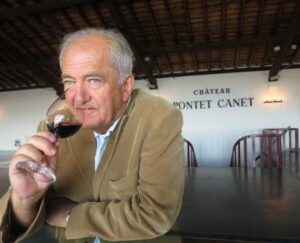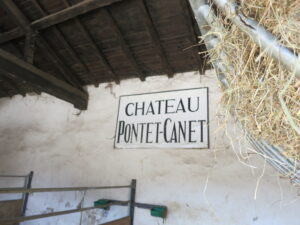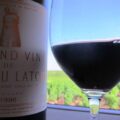2011 Pontet Canet Produced from an assemblage of 60% Cabernet Sauvignon, 35% Merlot, 4% Cabernet Franc and 1% Petit Verdot. Deep ruby in color, with scents of coffee, licorice, truffle, smoke and blackberry. The wine is fresh, pure, clean and filled with spicy cassis. Compared to recent vintages, this is a round, approachable, refined style of Pontet Canet finishing with silky, cassis and spice. 93-95 Pts
Jeff Leve How much less wine did you produce with your 2011 Pontet Canet?
Alfred Tesseron “The production of the 2011 Pontet Canet is close to 25% less than it was in 2010”.
Jeff Leve Is the lower volume in 2011 Pontet Canet due to low yields?
Alfred Tesseron “It was not just low yields. It had a lot to do with the size of the berries, which were very small and concentrated”.
Jeff Leve Obviously, 2011 Pontet Canet required extensive sorting and selection. How much of the yield was relegated to Les Hauts de Pontet, your second wine?
Alfred Tesseron “Not much. By placing more of the fruit in 2011 Pontet Canet, consumers get a better idea of what each vintage really tastes like. Because every vintage tells a different story, and we want the wines to taste like the vintage, we do not make a lot of our second wine”.
Jeff Leve What previous vintage would you compare your 2011 Pontet Canet with?
Alfred Tesseron “Perhaps it’s closest to 2008. This is due to the taste and character found in the wine”.
Jeff Leve Now that you’ve earned your first 100 Pt score from Robert Parker, and other chateaux are following your lead with biodynamic farming, what is the next step for you at Pontet Canet?
Alfred Tesseron “The goal at Pontet Canet is to do more than make the best wines possible. We want to make sure we continue producing wines in different styles, according to the vintage characteristics. Sameness is boring.”
Jeff Leve Do you see yourself as a winemaker?
Alfred Tesseron “No. I am not a winemaker. My team members are not winemakers either. As most of the work is done in the vineyards, we are growers. Our success and achievements at Pontet Contet are due to our efforts in the vineyards, not the winemaking. At the end of the day, our goal is to produce unique vintages of Pontet Canet that are for drinking, not just for wine tasting”.






8 Comments
Right on, Jeff!
Great info and profiles.
Rock n’ Roll!
Thanks Eddie! 2011 Pontet Canet is one of the few Bordeaux that seems to be selling as a future. Is it selling for your team?
Jeff, Thank you for the tip on 2011 Pontet Canet. This is probably the only 2011 Bordeaux I will buy. Keep up the good work with The Wine Cellar Insider!
Thanks for the nice words about The Wine Cellar Insider and Pontet Canet. You are right, Pontet Canet is worth considering buying in 2011.
Exactly the right attitude both to organic farming and lack of deselection. The Sauternais would certainly agree that most of the work is done in the vineyard – vinification should be relatively simple if you are starting with well grown and managed fruit. My only quibble with Pontet Canet is the price but that is a red Bordeaux phenomenon that all chateaux are collectively, at least in part, responsible for – I can’t help feeling that it will come back to bite them somehow.
Hi Steve… Thanks for the post. Pontet Canet has gone up in price. But they also continue to improve in vintage after vintage. Pontet Canet is making wine of Second Growth quality on a consistent basis and the wines are priced less than other wines in the same class. At least in my opinion, 2009 Pontet Canet and 2010 Pontet Canet are First Growth in quality. When you compare what Tesseron has priced those wines at, compared to other Bordeaux at the same level, they are again, at least in my view, fairly priced.
Hi Jeff,
Sorry, but i dont agree, what you say about prices. If you look at the costs you have to produce a bottle of red wine in Bordeaux and what price is asked per bottle in my eyes it is a too big difference.
Bordeaux has become a “high-price”-paradise… Look at Rhone, Burgundy or other Wineregions with good qualityreports… Prices (with exceptions) never go as high as like in Bordeaux.
But well, if the market is willing to pay i think everybody would take the money, because there is always somebody who will take the money. Wine has become absolute luxury and there is now a market for highpriced Wine (i like to call them marketingwines).
Hi Phillip
Thanks for dropping by and making the post. I hope it’s OK, but I do not agree. How can you say Burgundy is not expensive? Have you seen prices for DRC, Roumier, Leroy and any of the other top producers? Those wines can cosgt thousands of dollars! Or in Rhone, what about the La La’s from Guigal, Chapoutier, Chave or other top producers?
All the world’s best wines are equally expensive. At least they are expensive to me. Also, while you might not agree, I’m not sure what something costs to produce matters? How much does an artist pay for paint and canvas? Does it really cost that much to make great shows, suits, hand bags? What about the pills we take from a doctor?
At the end of the day, as you noted, wines are expensive for one reason. People are willing to pay the price. It’s that simple. Once people refuse to pay, prices will come down.
The one great things about Bordeaux is, there are a lot of choices at all price levels. You can buy really good wine for $25, and because there are often thousands of cases, the wine is easy to find. True, if you focus on the First Growths and other wines in that price range, the wines are expensive. But if you look at other wines, you can find delicious wines for fair prices.